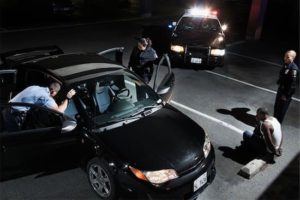
Police searching man’s car. Photo by © Masterfile Royalty Free
Loads of traffic-stop data collected by the Vermont State Police over the last five years confirms an occurrence Black Americans are all too familiar with. A recent report revealed stark disparities between the rates at which Black drivers were stopped by Vermont police compared to whites.
According to officials, African-American drivers pulled over by state police were five times more likely to be searched than white drivers, despite the fact that contraband was more likely to be found in the cars of white motorists, ABC News reports.
Per a study conducted by the Institute on Race and Justice at Boston’s Northeastern University, the percentage of traffic-stops resulting in searches was 5.1 for Blacks and 1.1 for whites. The study also revealed that contraband was found 80 percent of the time in searches involving white drivers, but only 68.5 percent of the time with Black drivers, the news site states.
States, including Vermont, began compiling traffic-stop data after a 1990’s racial profiling controversy involving New Jersey state troopers, the New York Times reports. The officers had targeted minority drivers for traffic-stops in hopes of catching drug runners.
According to the publication, data collected by Connecticut, Illinois, Maryland, Missouri, Nebraska, North Carolina and Rhode Island – states with the most extensive traffic-stop reporting policies – also show that African-American motorists are more likely to be pulled over and searched by police.
In Greensboro, North Carolina’s third largest city, officers were found to have used their discretion to search African-American drivers or their vehicles more than twice as often than white drivers, the New York Times reports. Yet, contraband like illicit drugs and firearms were found much more often when a white motorist was searched.
Col. Matthew Birmingham of the Vermont State Police blames implicit bias on the part of police officers, ABC News reports. He says although implicit bias is harder to “recognize and root out,” acknowledging that you have a bias is a good start to “moving these numbers in a positive direction.”
The disproportionate risks of driving while Black don’t stop there however.
According to a report by Back on the Road California, Black Californians are more likely to have their driver’s licenses suspended if they’re unable to make it to court or pay their ticket. Data collected by the Oakland Police Department between April 2013 to Oct. 2014 revealed that over 15,000 traffic violations were attributed to Black motorists while white drivers only incurred over 4,000 violations, Atlanta Black Star reports.
African-American drivers feel the squeeze when it comes to auto insurance too. A study conducted by the Consumer Federation of America (CFA) found that African-Americans living in predominately Black communities were being hit with much higher auto insurance rates. Per Atlanta Black Star, the report showed that while white drivers were charged an average of $622 a year, Black drivers were paying up to $1,060, a 70% increase.


